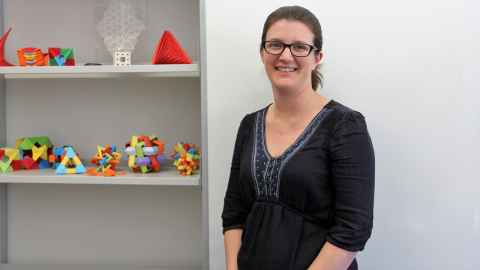Take 10 with... Claire Postlethwaite
Dr Claire Postlethwaite from the Department of Mathematics gives us 10 minutes of her time to discuss her research into the behaviour of solutions to differential equations.

1. Describe your research
Using heteroclinic networks as mathematical models for physical processes.
2. Now describe it in everyday terms!
Much of my research involves understanding the behaviour of solutions to differential equations: these are equations that describe how some quantity changes in time. I’m currently particularly interested in objects called heteroclinic networks, which are special types of solutions which when observed show intermittent behaviour - that is, you see one type of thing for a relatively long time, and then observe a very rapid switch to a different type of behaviour. I’m particularly interested in applications to a wide range of scientific fields: these sorts of networks arise naturally in mathematical models of populations, fluid dynamics, and cognitive systems, to name just a few.
3. Describe some of your day-to-day research activities
My research involves both computations and analytical calculations. Depending on the stage of a current research project I could be doing anything from meeting collaborators (possibly over Skype), reading papers, doing pencil-and-paper or numerical calculations for a project or writing or proof-reading a paper. Or possibly several of these at once!
4. What do you enjoy most about your research?
I absolutely love this job and I can’t imagine doing anything else. I love the satisfaction you get after solving a difficult mathematical problem, or writing computer code that finally works! I also enjoy collaborations, both with other mathematicians, and other scientists.
5. Tell us something that has surprised you in the course of your research.
That I’m allowed to do something I love, and people will pay me for it! More seriously, I’m often surprised by the sheer amount of stuff we don’t know about mathematical objects, and how much more there is to discover.
6. What questions have emerged as a result?
Sometimes it’s important to pause and think about which parts of the field are most important, and will have most impact elsewhere, rather than just trying to understand everything about the thing you are interested in today. So I guess the question here is “what research should I be doing?
7. How have you approached any challenges you’ve faced in your research?
Like many others, I have often experienced 'imposter syndrome'. My main worry has been that my research is boring, or pointless, or that no-one else finds it interesting. I’ve found that the best way to cure this is to go to a conference – I always come back feeling invigorated and excited to do more mathematics. On a much shorter time-scale, if I’m stuck on a research problem, I often find doing something completely different, like going for a run, can give me ideas on how to proceed. If that doesn’t work, explaining the issues to someone else (it doesn’t have to be someone who understands, a small child works just fine!) can spark an idea in my head.
8. What kind of impact do you hope your research will have?
My current research projects involve applications of heteroclinic networks to a wide range of scientific fields, including cognitive science, robotics, population modeling and fluid dynamics. I hope that the models I and my collaborators develop have the potential to answer a wide range of scientific questions.
9. If you collaborate across the faculty or University, who do you work with and how does it benefit your research?
I have a current collaboration with Matthew Egbert in Computer Science, but I’ve previously collaborated with researchers in SBS and Environmental Sciences. This latter collaboration was really beneficial to my career as it kick-started a research project (on modeling animal navigation) that was the basis for my first successful Marsden grant.
10. What one piece of advice would you give your younger, less experienced research self?
Try to see the big picture surrounding your research: don’t focus too tightly on your one little segment of it.